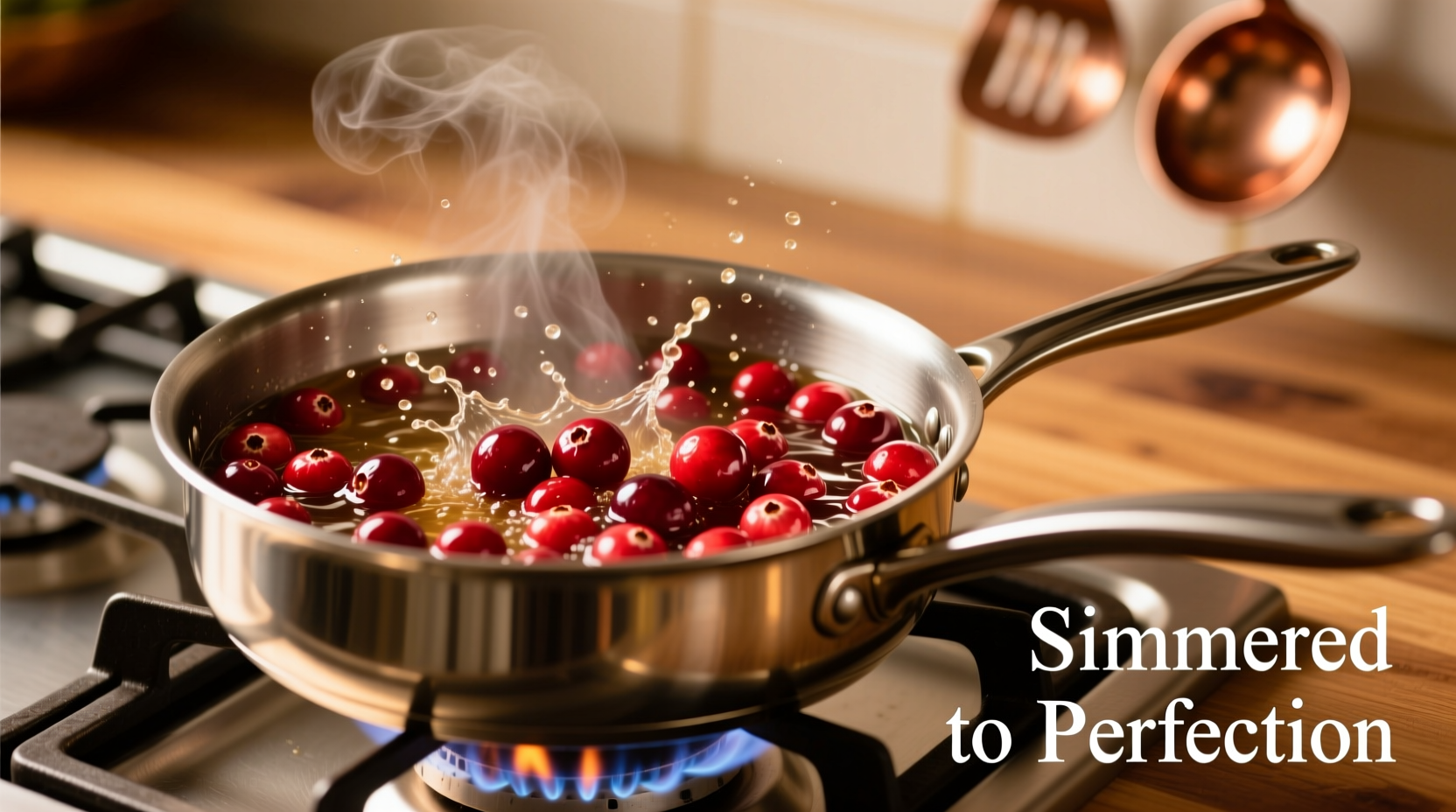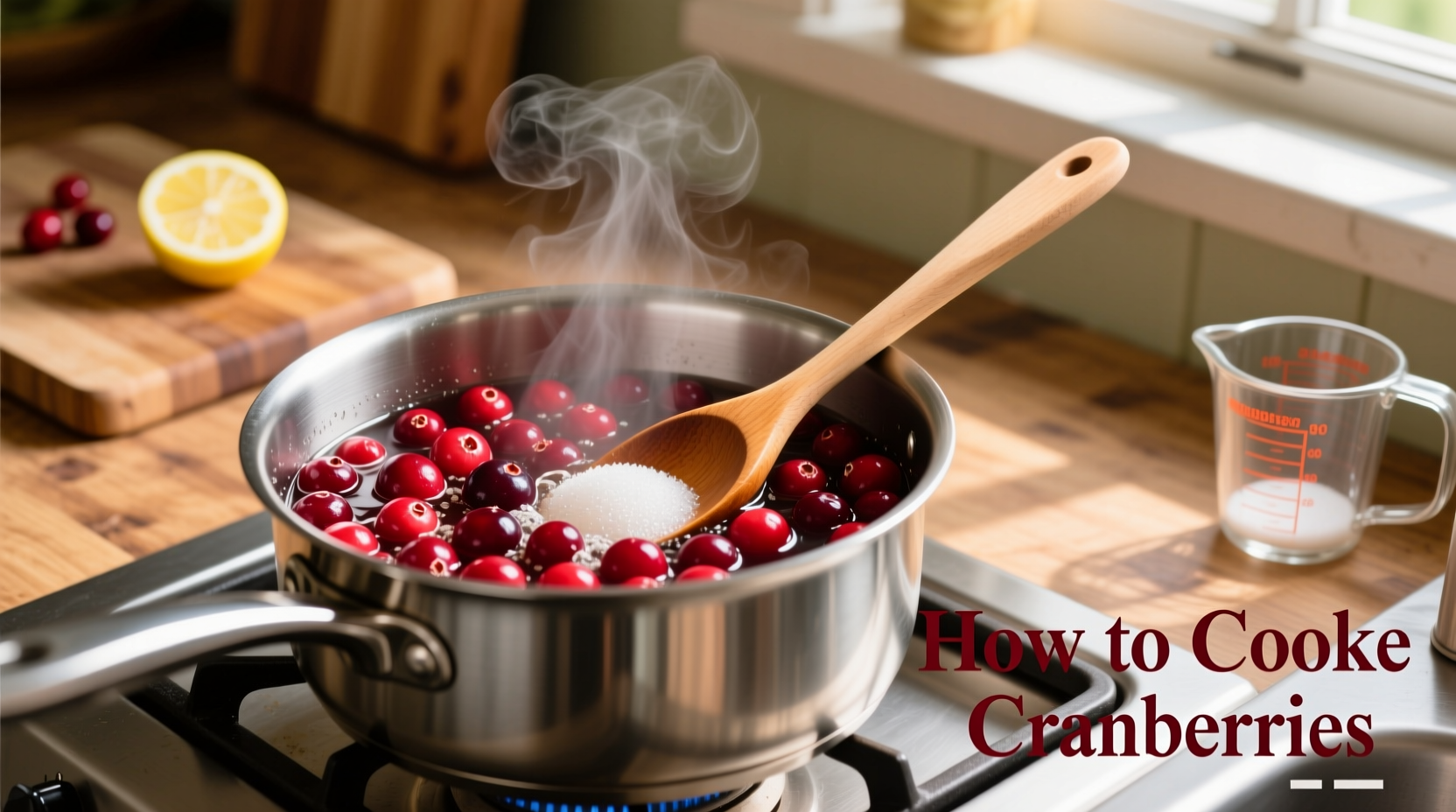The Essential Cranberry Cooking Method
Raw cranberries contain natural pectin and organic acids that make them unpleasantly tart when eaten fresh. Cooking breaks down these compounds while activating pectin for ideal texture. Professional chefs follow this foolproof stovetop technique:
- Combine 12 oz (340g) fresh cranberries, 1 cup (240ml) liquid (water, orange juice, or apple cider), and sweetener in a medium saucepan
- Bring to a gentle simmer over medium heat
- Cook uncovered for 10-15 minutes, stirring occasionally, until most berries have burst
- Remove from heat and cool - sauce will thicken as it cools
- Store in airtight container for up to 2 weeks
This basic how to cook fresh cranberries for sauce method works because cranberries reach optimal texture at 200-212°F (93-100°C). The critical moment comes when you hear the distinctive "pop" sound as individual berries burst - this indicates pectin release. Overcooking beyond 15 minutes creates unpleasantly mushy results, while undercooking leaves tart, raw-tasting berries.
Why Cranberries Require Specific Cooking Techniques
Cranberries contain four times more vitamin C than oranges and unique phytonutrients called proanthocyanidins. However, their intense tartness comes from quinic acid and citric acid levels that require careful balancing during cooking. Unlike other berries, cranberries have exceptionally high pectin content (up to 0.5-1.5% of fresh weight according to USDA research), which creates natural thickening but demands precise timing.
The USDA Agricultural Research Service confirms that cooking cranberries for 10-12 minutes preserves maximum antioxidant activity while transforming their natural bitterness into balanced flavor. This scientific insight explains why rushed or overcooked cranberry preparations often disappoint.
Four Professional Cranberry Preparation Methods
While the basic stovetop method works for most applications, different culinary goals require specific techniques. Here's how professional chefs approach various cranberry preparations:
| Method | Best For | Time Required | Sweetener Ratio | Texture Result |
|---|---|---|---|---|
| Classic Stovetop | Traditional sauce | 12-15 minutes | ¾ cup per 12oz berries | Smooth with some whole berries |
| Quick Microwave | Emergency preparation | 8-10 minutes | ⅔ cup per 12oz berries | Slightly chunkier |
| Slow Simmer | Gourmet applications | 20-25 minutes | ½ cup per 12oz berries | Complex, deep flavor |
| Dry Roasting | Baking applications | 15-18 minutes | ¼ cup per 12oz berries | Firm, holds shape |
Avoiding Common Cranberry Cooking Mistakes
Even experienced cooks make these critical errors when preparing cranberries:
- Adding all sweetener at once - Professional chefs add ⅔ of sweetener at start, then adjust after cooking completes
- Over-stirring - Excessive stirring breaks down berries too much; stir only every 2-3 minutes
- Ignoring altitude adjustments - Above 3,000 feet, increase liquid by 2-4 tablespoons to compensate for lower boiling point
- Skipping the resting period - Cranberry sauce continues thickening for 30 minutes after cooking
When how do you cook cranberries for Thanksgiving becomes your urgent question, remember that proper cooling time affects final texture more than cooking time. Rushing to serve warm sauce guarantees runny results.

Advanced Cranberry Cooking Techniques
For exceptional results, incorporate these professional chef secrets:
Flavor Layering Method
Add ingredients in stages: citrus zest with liquid, spices after berries begin popping, and sweet citrus juice during final minutes. This creates complex flavor development rather than flat sweetness. The National Agricultural Library confirms that sequential ingredient addition preserves volatile flavor compounds that would otherwise evaporate.
Texture Control System
For smooth sauce: Press cooked berries through fine-mesh sieve. For chunky relish: Remove ⅓ of berries after 8 minutes, continue cooking remaining berries, then combine. This professional technique ensures perfect texture control for different applications.
Storage Guidelines and Creative Uses
Properly stored cranberry preparations maintain quality significantly longer than most home cooks realize:
- Refrigerator: Up to 2 weeks in airtight container
- Freezer: Up to 1 year when stored in portion-sized containers
- Canning: Properly processed jars last 12-18 months
Don't limit yourself to traditional sauce - try these professional applications for cooked cranberries:
- Swirl into yogurt or oatmeal
- Use as glaze for roasted meats
- Mix into stuffing or grain salads
- Fold into cheesecake batter
- Create vinaigrettes with reduced sauce
When Standard Methods Fail: Context-Specific Adjustments
Not all cranberry cooking follows the standard formula. These context boundaries require special attention:
- Using frozen cranberries: Add 2-3 minutes cooking time; no need to thaw
- High-altitude cooking: Increase liquid by 15% above 5,000 feet
- Sugar substitutes: Liquid sweeteners require 25% less volume than sugar
- Organic vs. conventional: Organic berries may require slightly longer cooking due to thicker skins
Understanding these how to cook cranberries without sugar alternatives and context-specific adjustments separates adequate preparations from exceptional ones. Professional chefs always test sweetness after cooking completes, as perceived tartness changes dramatically during cooling.
Troubleshooting Guide
Fix these common cranberry cooking problems:
- Too tart: Stir in 1-2 tsp honey or maple syrup per cup of sauce
- Too sweet: Balance with 1 tbsp lemon juice or ¼ tsp cinnamon
- Too thin: Simmer uncovered 3-5 minutes more or add 1 tsp chia seeds
- Too thick: Whisk in 1-2 tbsp warm liquid until desired consistency
- Burned bottom: Immediately transfer to clean pot; salvage unburnt portion











 浙公网安备
33010002000092号
浙公网安备
33010002000092号 浙B2-20120091-4
浙B2-20120091-4